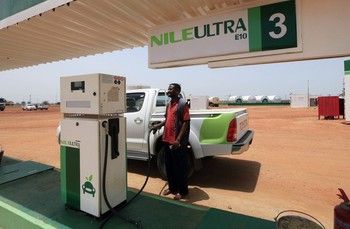Sudanese presidency calls for monitoring gasoline distribution to prevent a looming fuel crisis
June 9, 2015 (KHARTOUM) – The Sudanese presidency has instructed the ministry of oil to activate the work of the committee tasked with monitoring the distribution of gasoline in order to bring what it called the “petroleum products manipulation” to an end.

Sudan’s 2nd Vice-President, Hassabo Mohamed Abdel-Rahman, issued directives to activate the monitoring mechanism set up by the oil ministry to stop manipulation in the distribution of petroleum products and secure gasoline supply for all services and development sectors.
Abdel-Rahman, who met with the newly appointed minister of oil and gas, Mohamed Zayed Awad on Tuesday, stressed the need to take strict measures and to fill the gaps in the distribution of petroleum products to the gas stations.
Awad described to reporters following the meeting the lining up of cars at the gas stations as “fabricated crisis”, saying the fuel quota of Khartoum state has been raised from 2,500 to 3,000 cubic meters during the past days.
He revealed that the monitoring mechanism enjoys wide powers in order to prevent any manipulation which could negatively impact on people’s lives, saying it is comprised of several concerned bodies including the security services.
Awad underscored his ministry’s commitment to provide the various states with their full fuel quotas particularly the farming states.
The minister promised further oil discoveries to increase production, noting that he briefed the vice president on the supply position regarding oil derivatives across the country.
Sudan lost 75% of its oil reserves after the southern part of the country became an independent nation in July 2011, denying the north billions of dollars in revenues. Oil revenue constituted more than half of Sudan’s revenue and 90% of its exports.
In September 2013, protests erupted in Sudan’s major towns following an announcement by the government that it was reducing subsidies on fuel and other basic commodities, leading to calls for regime change.
At least 200 protesters died, 15 of them children and more than 800 others have been detained.
(ST)
